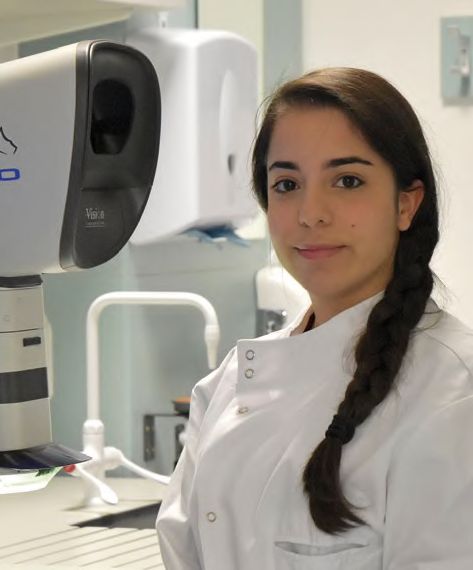
Physiology News Magazine
Project report: the effect of maternal low protein diet on the neuromuscular system of the offspring in mice
News and Views
Project report: the effect of maternal low protein diet on the neuromuscular system of the offspring in mice
News and Views
Ifigeneia Giakoumaki
University of Liverpool, UK
https://doi.org/10.36866/pn.101.11

As part of my MRes course in Musculoskeletal Ageing, based at the University of Liverpool (“Centre for Integrated research into Musculoskeletal Ageing” MRes), I undertook a research project funded by The Physiological Society which was awarded to a new lecturer, Dr Aphrodite Vasilaki. The aim of the project was to determine the effect of maternal low-protein diet on the neuromuscular system of the offspring, using mice as a model organism. The rationale behind this project was to identify whether processes occurring later in life, such as sarcopenia, are influenced by events taking place during prenatal and early stages post pregnancy.
Previous studies have shown that maternal malnutrition can during the early stages of development result in reduced muscle mass and this may lead to sarcopenia later in life. We investigated whether maternal malnutrition could cause a predisposition to sarcopenia and this could be prevented by optimisation of the nutrition at the early stages of development.
Two cohorts of female mice were introduced to and maintained on either a normal (20% protein) or low (5%) protein diet for two weeks and then mated. The two types of protein diet were maintained throughout pregnancy and lactation.
Newborns were cross-fostered to different lactating dams (following either a normal or a low-protein diet), within 24 hours after birth. Mice were collected and euthanised at weaning (21 days old) and muscle tissue and spinal cord samples were collected for analysis.
Results from 21-days old pups demonstrated a significant difference depending on the maternal diet. Specifically, pups fed by mothers on a normal protein diet during lactation had a healthier body and muscle weight than those fed a low-protein diet. On a tissue specific level, the number and size of muscle fibres were significantly different between the 21-days old pups, with those fed by mothers on a low protein diet during lactation showing the most severe effects. In terms of neuronal function, the neuromuscular junction morphology appeared to be distorted in mice following a low-protein diet during pre-natal stages, regardless of their nutrition later in life (early post-natal stages). However, the number and size of a-motoneurons was significantly different in mice born from a normal mother but fed by a mother on a low-protein diet during lactation, compared with the other groups.
Thus, our preliminary data show that maternal low-protein diet can negatively affect the neuromuscular system of the offspring. More analysis is underway to determine whether those defects can be modified with optimisation of the nutrition later in life.
This project has been very successful, since we have tested a novel hypothesis based on the funding provided by The Physiological Society. In addition, the project helped me personally in progressing to my PhD, which is now examining the effects of a low-protein diet on the neuromuscular system at a molecular level.
